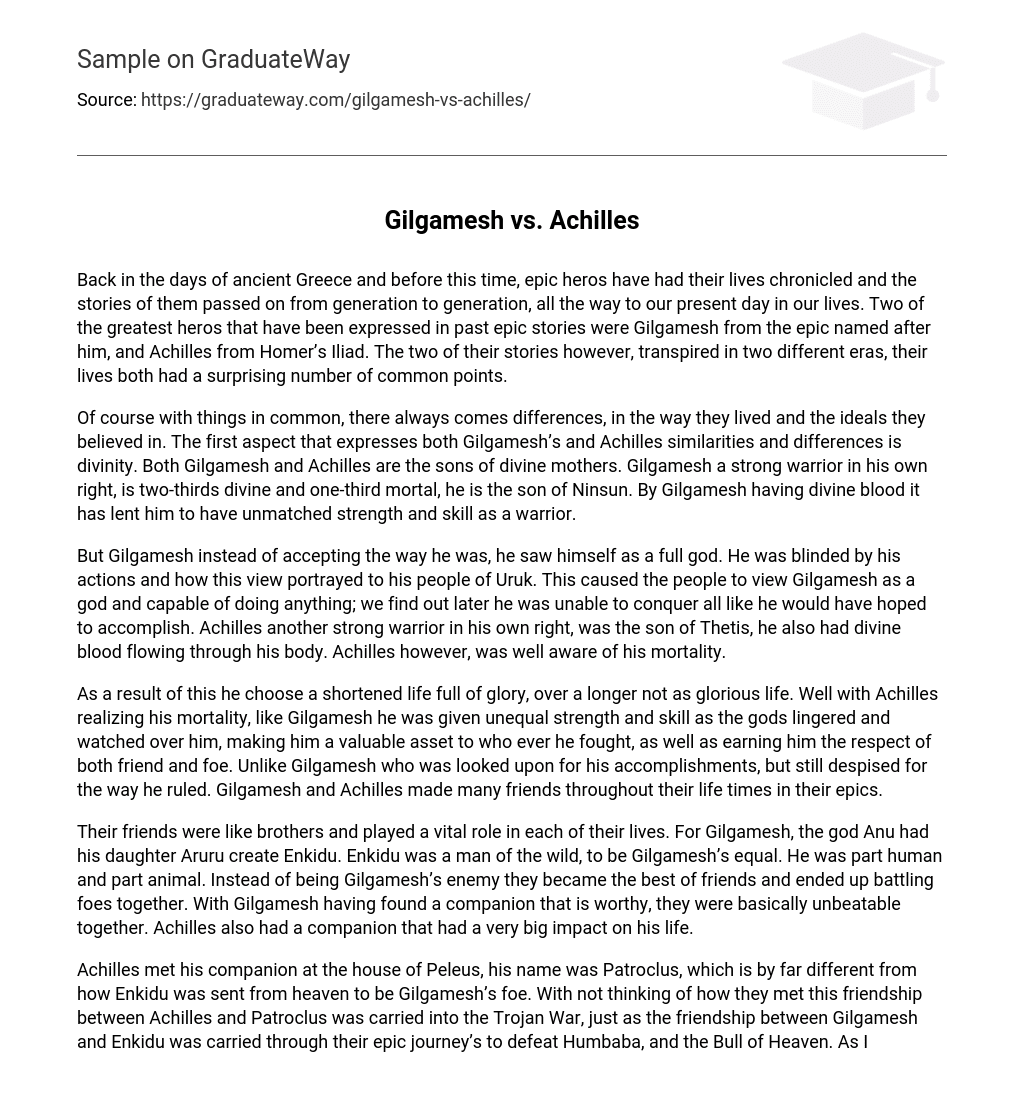Since ancient Greece and before, epic heroes have been recorded and their stories transmitted through generations. Even today, the lives of these heroes continue to be celebrated. Among them are Gilgamesh from his eponymous epic and Achilles from Homer’s Iliad. Despite existing in different time periods, these two heroes possess a significant amount of similarities in their lives.
Both Gilgamesh and Achilles have similarities and differences in their way of life and beliefs. They both have divinity, as they are born to divine mothers. Gilgamesh, a strong warrior himself, is composed of two-thirds divinity and one-third mortality as Ninsun’s son. This divine heritage gives him unmatched strength and battlefield skills.
Although they both had divine ancestry, Gilgamesh and Achilles held contrasting views regarding their true identities. Gilgamesh believed himself to be a god and lacked comprehension of how his actions affected the people of Uruk. Consequently, he was worshipped as almighty but ultimately fell short of attaining absolute control. Conversely, Achilles, also being born with celestial lineage as Thetis’ offspring, possessed a clear awareness of his own mortality.
By recognizing his limited lifespan, Achilles made the choice to live a brief but illustrious life rather than a long, unremarkable one. Similar to Gilgamesh, Achilles possessed extraordinary strength and skill bestowed upon him by the gods, rendering him an invaluable asset in battles and earning him admiration from both allies and enemies. However, unlike Gilgamesh who was praised for his achievements but disliked for his leadership style, Gilgamesh and Achilles both formed numerous friendships throughout their respective epics.
Both Gilgamesh and Achilles had companions who played a significant role in their lives, functioning almost like brothers. In the case of Gilgamesh, Anu, the god, had Aruru, his daughter, create Enkidu, a being who was both human and animal, specifically designed to be Gilgamesh’s equal. Rather than becoming enemies, Gilgamesh and Enkidu formed an inseparable bond and fought adversaries together. Their friendship made them an unbeatable duo. Similarly, Achilles also had a companion who profoundly influenced his life.
Achilles and Patroclus formed a strong friendship when they met at Peleus’ house, while Enkidu was sent from heaven to be Gilgamesh’s adversary. Despite the different circumstances of their meeting, both friendships endured throughout significant challenges. Achilles and Patroclus fought together in the Trojan War, much like how Gilgamesh and Enkidu journeyed together to defeat Humbaba and the Bull of Heaven. Ultimately, both Gilgamesh and Achilles were able to find faithful companions that supported them throughout their lives.
Both Gilgamesh and Achilles were deeply saddened by the deaths of their comrades, despite their impressive accomplishments together. While they had similar reactions to grief, their subsequent choices differed. Gilgamesh chose to honor Enkidu’s death by proclaiming a period of mourning for him across the entire kingdom. Conversely, Achilles believed that seeking revenge for his friend’s death was the only suitable way to pay homage.
Following the demise of Enkidu, Gilgamesh, previously a creation of the gods, became conscious of his own mortality. Rather than accepting and honoring Enkidu’s passing, Gilgamesh embarked on a mission to uncover immortality. Along his journey, he encountered Utanapishti, who possessed knowledge of eternal life. Sadly, Gilgamesh failed the challenge of staying awake for seven consecutive days and nights and also lost the plant with rejuvenating properties that could restore youth. It is regrettable that Gilgamesh had intended to bring this plant back to Uruk with the purpose of revitalizing all elderly individuals.
After failing at both tasks he had set for himself, Gilgamesh came to the realization that achieving immortality was impossible. However, the death of his companion Enkidu had a positive impact on Gilgamesh. It helped him overcome his arrogance as a king and opened his eyes to the harsh reality of his world. In contrast, Achilles had a different perspective than Gilgamesh. Achilles believed in living a shorter life filled with glory and honor, and he decided to avenge Patroclus by killing Hector. It didn’t matter to Achilles that Hector was wearing the armor that originally belonged to him, Patroclus had been wearing it anyway.
Achilles held the belief that taking action to avenge his partner’s death was more preferable than lamenting over it indefinitely, even if it meant sacrificing his own life. He did not aspire for immortality like the gods and acknowledged it as a realm exclusively for them. Unlike Gilgamesh, Achilles valued glory in death rather than in life. Although Gilgamesh and Achilles had various resemblances in their lives, differences naturally accompanied these similarities.
Although Gilgamesh and Achilles had contrasting views on death, with one desiring immortality and the other regarding death as a means to achieve honor and glory, it is indisputable that their companions played a significant role in shaping their lives. The influence of their comrades was so profound that envisioning how their lives would have unfolded without them is challenging. Ultimately, both heroes will be immortalized and commemorated for countless generations.





